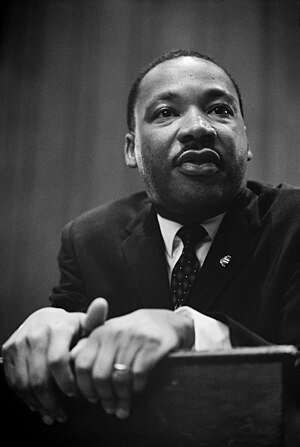Born in 1929, Martin Luther King Jr.’s actual birthday is January 15 (which in 1929 fell on a Tuesday). The earliest Monday for this holiday is January 15 and the latest is January 21. The Monday observance is similar for those federal holidays which fall under the Uniform Monday Holiday Act. Martin Luther King, Jr., Day is observed annually on the third Monday in January. The day commemorates the life and work of Dr. King, who was a Baptist minister and prominent leader in the American civil rights movement. People are encouraged to use the day to “reflect on the principles of racial equality and nonviolent social change espoused by Dr. King.” The holiday is typically observed with events such as marches and rallies and speeches by politicians and civil rights leaders.
Senators Jesse Helms and John Porter East (both North Carolina Republicans) led the opposition to the holiday and questioned whether King was important enough to receive such an honor. Helms criticized King’s opposition to the Vietnam War and accused him of espousing “action-oriented Marxism”. Helms led a filibuster against the bill and on October 3, 1983, submitted a 300-page document to the Senate alleging that King had associations with communists. Democratic New York Senator Daniel Patrick Moynihan declared Helms’ document a “packet of filth”, threw it on the Senate floor, and stomped on it
The campaign for a federal holiday in King’s honor began soon after his assassination in 1968. President Ronald Reagan signed the holiday into law in 1983, and it was first observed three years later on January 20, 1986. At first, some states resisted observing the holiday as such, giving it alternative names or combining it with other holidays. Official observance in each state’s law as well as federal law occurred in 2000.
Brave passage
President Ronald Reagan originally opposed the holiday, citing cost concerns. When asked to comment on Helms’ accusations that King was a communist, the president said “We’ll know in thirty-five years, won’t we”, referring to the eventual release of FBI surveillance tapes that had previously been sealed.[8] But on November 2, 1983, Reagan signed a bill into law, proposed by Representative Katie Hall of Indiana, to create a federal holiday honoring King.[9][10] The final vote in the House of Representatives on August 2, 1983, was 338–90 (242–4 in the House Democratic Caucus and 89–77 in the House Republican Conference) with 5 members voting present or abstaining, while the final vote in the Senate on October 19, 1983, was 78–22 (41–4 in the Senate Democratic Caucus and 37–18 in the Senate Republican Conference),[12][13] both veto-proof margins. The holiday was observed for the first time on January 20, 1986.[10] It is observed on the third Monday of January.[14]
The bill also established the “Martin Luther King, Jr. Federal Holiday Commission”[10] to oversee observance of the holiday, and Coretta Scott King, King’s wife, was made a member of this commission for life by President George H. W. Bush in May 1989.

